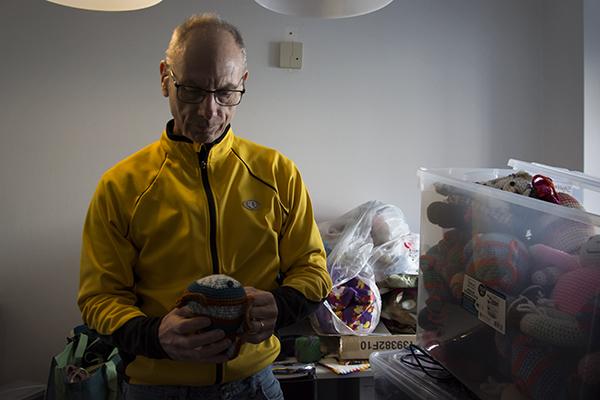Dozens of homeless people crowded around Georgetown Ministry Center on Tuesday morning during one of the coldest winters D.C. has seen in recent years for access to showers, computers and laundry services.
Inside the small building located in an alley off of Wisconsin Avenue, people filled the tables and chairs all the way to the door. Some sat at computers as loud conversations started to fill the room. Others ate sandwiches and folded laundry. The staff stood near the supply counter, talking to each other as homeless individuals came in to get out of the cold.
Soreta Waldeck Von Bulow, a homeless woman who has gone to the Georgetown Ministry Center for about four years after she said an international human rights organization was unable to help her, was sitting in the corner near clusters of filled tables.
She said the daytime center has to accommodate up to 20 extra people during the day when the temperature drops.
“They have gone out of their way to accommodate me,” Von Bulow said. “If there’s more [people,] it’s taken care of immediately.”
Local organizations for homeless people like Georgetown Ministry Center are feeling the pressure as the number of homeless families living in shelters could surpass last year’s total, with 900 families expected to stay in shelters by March, the Washington Post reported.
Gunther Stern, the executive director of the Georgetown Ministry Center, said homeless individuals stay at the center during the day and live under bridges at night, which puts them at a greater risk of dying from the cold. He said though the center can’t accommodate people at night, giving them a chance to get warm going the day helps them survive.
“There’s always a group of people that won’t go in. Some of them don’t even come into our place during the day,” Stern said.
Organizations like Miriam’s Kitchen in the West End say they’ve dealt with a shortage of supplies. The Post reported that the number of D.C.’s homeless individuals in shelters is set to “eclipse” last year’s count of 4,000.
Georgetown Ministry Center is also experiencing shortages in supplies with the larger number of people asking for help. On Tuesday, volunteer Jane Gasda said she had to turn down homeless women who requested underwear.
“We’re not always getting the donations that they want,” she said.
With the sustained cold weather, Gasda expects that the center will see fewer donations. But donation fatigue is typical after long periods of cold weather, she said.
“With the weather going on this long, my guess is that they’ll start to get less donations. I think that’s normal,” she said.
Under D.C. law, all members of the homeless population have the right to access shelters when the city puts out a hypothermia alert, even if shelters are full.
Tom Murphy, the communications director for Miriam’s Kitchen, said this winter has been “no exception” to the high demand shelters have faced during the winter months. Miriam’s Kitchen serves about 300 homeless people each day, according to the organization’s website.
Last winter, shelters in the area were at capacity as D.C. endured one of its coldest winters and heaviest snow totals. This month, D.C. saw record cold temperatures and at least four inches of snow.
Murphy said the shelter faced a coffee shortage this winter. Miriam’s Kitchen usually uses 55 pounds of coffee a week.
“When a person has been up all night in the cold, the first thing any of us would want is a cup of coffee to warm and wake us,” he said.
He said the D.C. community has come together at times to help replenish the shelter’s supplies. People have donated over 600 pounds of coffee, and a local consulting firm, McBee Strategic Communications, has given away 100 sleeping bags.
Beau Stiles, the program coordinator for the Georgetown Ministry Center, said the group has also experienced shortages of supplies because deliveries can’t get to the shelter in the snow.
“The temperature records have been falling. There’s been record lows,” he said.
In November, the D.C. Council passed a bill to improve the conditions of homeless shelters in the city by providing families who stay in shelters with more privacy. Mary Cheh, a GW Law School professor and the Council member for Ward 3, helped introduce the bill.
Gasda said the center’s closet for donated clothing has had to move across the street to make room for more people.
“There are other places that do a better job as far as distribution of clothing,” Gasda said.







